Reppy Institute for Peace and Conflict Studies
Beijing Tightens Its Political Grip on Hong Kong

Magnus Fiskesjö, EAP/PACS/SEAP
Magnus Fiskesjö, associate professor of anthropology, discusses the atmosphere in China on NPR's Morning Edition.
Additional Information
Krzysztof Wodiczko: The Art of Un-War

March 28, 2024
7:30 pm
Willard Straight Theatre
Krzysztof Wodiczko: The Art of Un-War, a film directed and produced by Maria Niro, explores the life and work of renowned artist Krzysztof Wodiczko. It delves into Wodiczko's powerful artistic interventions created as responses to the inequities and horrors of war and injustice. The artist’s interventions throughout the narrative become powerful examples of how art can be a catalyst for social change and healing.
The screening is followed by a Q&A session with Krzysztof Wodiczko and director Maria Niro, who will also participate in the discussion via Zoom.
About the Film
"The Art of Un-War" takes viewers on a captivating journey through the life and artistic interventions of renowned artist Krzysztof Wodiczko. For over 50 years Wodiczko has explored the profound impact of violence on humanity and the transformative power of art as a medium for public discourse. The film explores Wodiczko's monumental slide and video projections on architectural facades and monuments, which serve as powerful vehicles for addressing themes such as war trauma, displacement, history, memory, and public communication.
About the Artist
Krzysztof Wodiczko is renowned for his large-scale slide and video projections on architectural facades and monuments. He has realized more than 90 such public projections in Australia, Austria, Belgium, Canada, England, Germany, Holland, Northern Ireland, Israel, Italy, Japan, Mexico, Poland, Spain, Switzerland, and the United States. Since the late 1980s, his projections have involved the active participation of marginalized and estranged city residents. Simultaneously, and also internationally, he has been designing and implementing a series of nomadic instruments, vehicles and other cultural equipment with the homeless, immigrants, alienated youth, war veterans and other operators for their survival, communication and expression in the public space.
He received the Hiroshima Art Prize "for his contribution as an international artist to the world peace", and represented Poland and Canada in Venice Biennale (Canadian Pavillion and Polish Pavilions). He is also recipient of Skowhegan Medal for Sculpture, the Georgy Kepes Award, MIT, the Katarzyna Kobro Prize, and "Gloria Artis" Golden Medal from Polish Ministry of Culture. Krzysztof Wodiczko is a Professor of Art, Design, and the Public Domain, Emeritus at Harvard’s Graduate School of Design, Visiting professor at the Media Art department at the Academy of Fine Arts in Warsaw, and a Distinguished Visiting Professor at the University of Pennsylvania in Philadelphia.
About the Film Director
Maria Niro is a New York City-based artist and filmmaker who creates films that engage and inspire viewers to create social change. Her moving image work includes long-form documentaries and short art films. Her award-winning documentary, Krzysztof Wodiczko: The Art of Un-War (2023), which chronicles the life and political work of the internationally acclaimed artist Krzysztof Wodiczko, has been broadcast on TV Ontario (TVO) and screened at festivals and museums worldwide, including the New York Jewish Film Festival at the Walter Reade Theatre at Lincoln Center, Artecinema Teatro San Carlo, National Gallery of Art in DC, MIT, and Harvard Art Museums, among others. Niro’s short art films have been shown at the Whitechapel Gallery, Microscope Gallery, Queens Museum, and Anthology Film Archives, among other venues. Niro is a member of New Day Films, a filmmaker-owned and run distribution company providing social issue documentaries to educators since 1971.
Tickets
Order your free tickets
Host
Judith Reppy Institute for Peace and Conflict Studies
Co-Hosts
Cornell Cinema
Co-Sponsors
Johnson Museum of Art
Institute for European Studies
Department of History of Art & Visual Studies
Department of Science & Technology Studies
Department of Romance Studies, Polish Language Program
Department of Performing and Media Arts
Additional Information
Program
Einaudi Center for International Studies
Reppy Institute for Peace and Conflict Studies
Institute for European Studies
Rebel Taxation
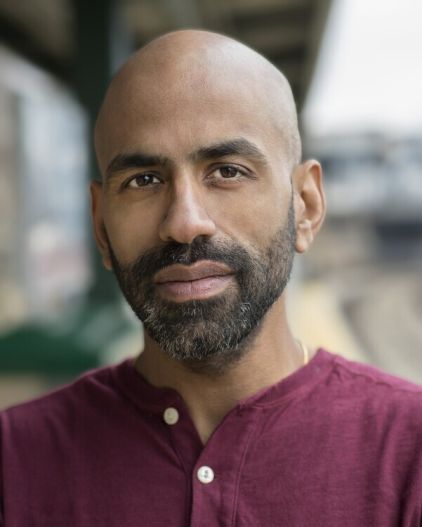
March 21, 2024
12:00 pm
Uris Hall, G08
Payments made to non-state armed groups are often treated as predation. But rebels deploy multiple logics when constructing their taxation systems, many of which cannot be reduced to extortion. Rebels also use taxation as a “technology of governance” to resolve a number of social and political challenges related to constructing a wartime order. Drawing on field work in three different countries (Colombia, India, South Sudan), Zachariah Mampilly, Marxe School of Public and International Affairs, CUNY, looks at the distinct taxation systems established by armed groups in each.
In Colombia, the author focuses on the FARC-EP’s taxation of coca to reveal the ideological and political factors that shaped their taxation system. In India, he examines how the NSCN-IM implemented distinct taxation regimes across four distinct subnational areas of control. And finally, in South Sudan, he explores the role of external actors in shaping the nature of the rebel taxation system.
About the Speaker
Zachariah Mampilly is the Marxe Endowed Chair of International Affairs at the Marxe School of Public and International Affairs, CUNY and a member of the doctoral faculty in the Department of Political Science at the Graduate Center, CUNY. He is the Co-Founder of the Program on African Social Research. He is the author of Rebel Rulers: Insurgent Governance and Civilian Life during War and with Adam Branch, Africa Uprising: Popular Protest and Political Change. His writing has also appeared in Foreign Affairs, Jacobin, The Hindu, Africa's a Country, N+1, Dissent, Al Jazeera, The New York Times, The Washington Post and elsewhere.
HostJudith Reppy Institute for Peace and Conflict Studies
Additional Information
Program
Einaudi Center for International Studies
Reppy Institute for Peace and Conflict Studies
Latin American and Caribbean Studies
Institute for African Development
South Asia Program
Future Fish Wars

February 8, 2024
12:00 pm
Uris Hall, G08
The macro and micro-scale impacts of climate change in Pacific Island Countries and Territories
The Pacific Islands are exemplary locations for the Anthropocene: stronger tropical storms, coral bleaching, and catastrophic sea level rise are visceral images and realities of the climate crisis. However, these are merely the environmental and ecological impacts. Less attention has been given to the social and political consequences of climate change for Pacific Island Countries & Territories.
This seminar will set the stage for a conversation around the macro and micro impacts of climate change, namely the geopolitical games resulting from fisheries redistribution and the food security and nutrient supplies for island communities, and how these intersect with local, regional, and global conservation goals.
About the Speaker
Dr. Steven Mana‘oakamai Johnson (he/him/‘o ia) is a Kānaka Maoli (Native Hawaiian) scientist, born and raised on the island of Saipan, located in Micronesia. Currently, he is an assistant professor in Natural Resources and the Environment at Cornell University. His research questions are informed by his heritage and upbringing, focusing on the impacts of climate change, colonialism, and conservation on coastal communities, primarily in the Pacific Islands. He uses social, environmental, and climate data to develop equitable and cooperative solutions for coastal communities. This work is a direct practice of his kuleana (responsibility) to use his knowledge and skills to improve the social and environmental spaces he is a part of.
Host
Judith Reppy Institute for Peace and Conflict Studies
Additional Information
Program
Einaudi Center for International Studies
Reppy Institute for Peace and Conflict Studies
Delays, Half-Measures and Bad Enforcement Are Hurting Ukraine’s Cause
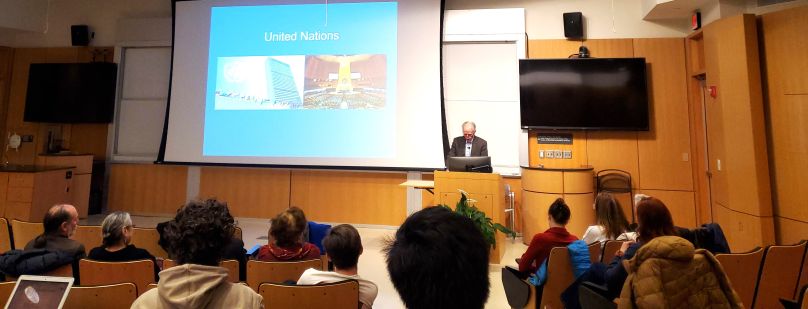
David Cortright, Visiting PACS Scholar
Reppy Institute visiting scholar David Cortright discusses sanctions against Russia in new op-ed.
Additional Information
Climate Change, Disasters, and Armed Conflicts
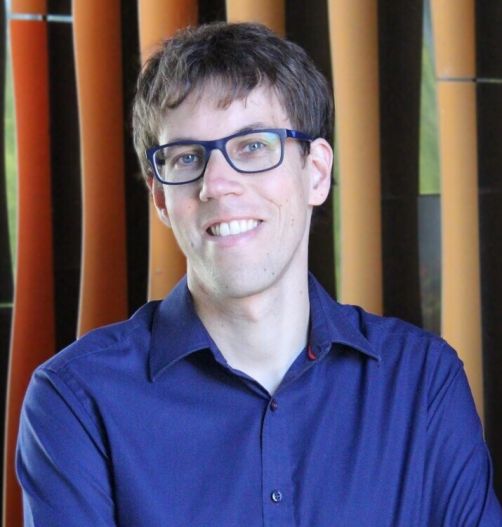
March 14, 2024
12:00 pm
Disasters like droughts, earthquakes, floods, and storms are becoming more frequent and intense, among others due to climate change. Consequentially, both decision makers and scholars are increasingly concerned about the security implications of disasters. At the same time, the number of armed conflicts globally is on a historical height. However, as of yet, little is known on how disaster impacts the dynamics of such conflicts. In other words: How do conflict parties react if a disaster strikes a civil war zone?
Tobias Ide presents insights from his recent book on this question, drawing on quantitative and qualitative data from 31 civil wars in 21 countries. Among others, he finds that disasters open opportunities for rebel groups, that disasters can also facilitate conflict de-escalation and diplomacy, that situational (rather than structural) factors shape the responses of conflict parties, and that gender is a mediating variable between disasters and conflict dynamics.
About the Speaker
Tobias Ide is a Senior Lecturer in Politics and International Relations at Murdoch University Perth and a Specially Appointed Professor at Hiroshima University. Holding PhDs in Political Science and Earth Science, he has worked intensively on the intersections of climate change, the environment, peace, and conflict. Tobias has published over 60 journals articles since 2014, including in International Security, Journal of Peace Research, and Nature Climate Change. In 2023, he received the ISA Emerging Peace Studies Scholar Award and the International Science Prize for Peace and Ecology in the Anthropocene.
Recent publications:
Catastrophes, Confrontations, and Constraints: How Disasters Shape the Dynamics of Armed Conflicts. MIT Press (2023)
Rise or Recede? How Climate Disasters Affect Armed Conflict Intensity. International Security 47(4), 50-79 (2023).
The Future of Environmental Peace and Conflict Research. Environmental Politics 32 (6), 1077-1103 (2023).
Climate, Women, and Conflict. Global Studies Quarterly 3 (3), ksad039 (2023).
Climate Change and Australia's National Security. Australian Journal of International Affairs 77 (1), 26-44 (2023).
Register to attend the seminar here
Host
Judith Reppy Institute for Peace and Conflict Studies
Additional Information
Program
Einaudi Center for International Studies
Reppy Institute for Peace and Conflict Studies
Synchronized Sixth Sense
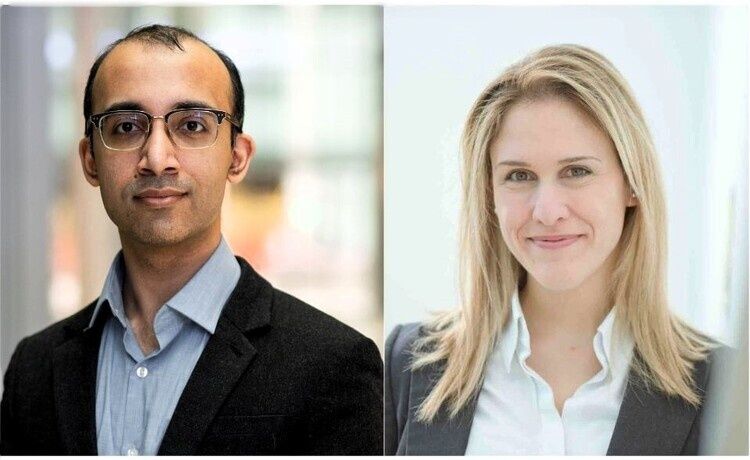
February 22, 2024
12:00 pm
How disparate humanitarian agents leverage AI tools to cultivate collaborative, anticipatory, and timely aid responses during conflicts.
This empirical study examines an overlooked yet deeply disconcerting dilemma facing humanitarian organizations operating in conflict zones. As complex conflicts evolve into new and numerous demands on humanitarian agents, they are often met with specialized, independent, organized efforts. But these well-meaning efforts often devolve into piecemeal, un-coordinative, post-hoc responses that are characterised by effort duplication, and even inadvertent violations of the 'leave no one behind' humanitarian principle. The elusive 'holy grail' in humanitarian work is to find a way to transform such uncoordinated and post-hoc efforts into an anticipatory, coordinative template of interpretation and action (i.e. collaborative praxis).
This multi-site digital ethnography examines one such transformative process - a Human AI (HAI) assemblage consisting of various human agents (NGOs, Transnational humanitarian agents, governments), and machine intelligences (NLP and predictive analytics tools) that collaboratively develop shared interpretation and anticipatory action trajectories for two ongoing humanitarian conflicts zone (Sudan and Gaza). This study finds that human and machine interactions here are distinguished by opposite mechanisms of sensemaking convergence (i.e. converging interpretations over 'temporal flow' of crises, agreements over institutional factors that exacerbate crisis, etc) and institutional divergence (i.e. Intentionally maintaining unique institutional subject positions, 'baking in' different normative understandings into models etc). The insights from our grounded, processual model contribute to literatures on AI coordination, Humanitarian organizations, and sensemaking analysis.
About the Speakers
Shivaang Sharma is a PhD candidate on Collective Intelligence Systems and Adjunct lecturer on Social Innovation at UCL School of Management, UK. He is currently working alongside a cluster of INGOs to monitor and respond to ongoing armed conflicts in Africa and the Middle East. He has 11 years of experience of working in conflict zones for organizations including UN-OCHA (Office for the Coordination of Humanitarian Affairs), IMMAP, WWF (World Wide Fund for Nature). He is leading an initiative to build a collaborative community around the use of AI tools across humanitarian sectors.
Angela Aristidou specialises in strategy and entrepreneurship at University College London's School of Management and she is a Fellow (Faculty Affiliate) at Stanford University's Digital Economy Lab, in the Human-centred AI Centre. Angela is an international award-winning academic (among other: Fulbright; Stanford University's CASBS), she is solo grant-holder for a UK Research Innovation Future Leader Fellowship (approx. £1.7 UK million pounds; 2020-2028) and she currently leads a team of researchers examining digital innovations in the UK, USA, China and Canada. Angela is an expert in how private tech companies, governments and public sector organisations, nonprofits and communities collaborate to innovate for public good.
Register to attend the seminar here
Host
Judith Reppy Institute for Peace and Conflict Studies
Additional Information
Program
Einaudi Center for International Studies
Reppy Institute for Peace and Conflict Studies
The Micro-Foundations of Norm Entrepreneurship

March 7, 2024
12:00 pm
Uris Hall, G08
Bohuslav Ečer and the Crime of Aggression
Finnemore and Sikkink’s 1998 ‘norm life cycle’ model has inspired a substantial literature investigating norms’ emergence and staying power. However, because their model hinges on Sunstein’s ‘tipping point’ theory, Adam Lerner, Associate Professor at UMass Lowell, argues it biases scholarship towards powerful actors with resources to spread norms, often overlooking the micro-foundations of norm entrepreneurship—intellectual work involved in reshaping ideas and communicating them to relevant audiences. To remedy this gap, the research team argues for a distinction within their model between norm entrepreneurs and norm popularizers and demonstrates how research into the former can promote a fruitful partnership between IR and work in the history of political thought (HPT) tracing inflection points in norms’ life cycles.
This presentation will illustrate this argument with multi-archival research (conducted in the US, UK, and Czechia) into Bohuslav Ečer, Czechoslovakia’s representative at the 1943-1948 UN War Crimes Commission. Though much of his memory has been lost to history due to both communist repression and the American bias of existing scholarship, the presentation will demonstrate Ečer was a pivotal norm entrepreneur with regards to the criminality of aggressive war. Drawing on previously uncited evidence, we show how Ečer’s ideas developed and spread, shaping US wartime policy and, ultimately, the foundational 1945 Nuremberg Charter. Appreciation of Ečer’s role both contributes to our understanding of a pivotal norm in international criminal law’s emergence and enriches our theoretical understanding of norms’ life cycles.
About the Speaker
Adam B. Lerner is Associate Professor of Political Science and Director of the Bachelor of Liberal Arts Program at UMass Lowell. His research focuses on international political theory, and he is particularly interested in the legacy of mass violence in the international system and tools for global repair and reconciliation. His first book, From the Ashes of History: Collective Trauma and the Making of International Politics (OUP, 2022) received the Peter Katzenstein Book Award from Cornell, the Edgar S. Furniss Award from Ohio State, the ISA International Ethics Book Award, and was runner up for the ISA Theory Book Prize and the ECPR Hedley Bell Book Prize. His refereed articles have appeared in International Studies Quarterly, European Journal of International Relations, Perspectives on Politics, International Affairs, International History Review, and International Theory, among other outlets. He received a BA from Cornell University and an MPhil and PhD from the University of Cambridge.
Host
Judith Reppy Institute for Peace and Conflict Studies
Co-sponsor
Institute for European Studies
Additional Information
Program
Einaudi Center for International Studies
Reppy Institute for Peace and Conflict Studies
Institute for European Studies
ChatGPT's One-Year Anniversary

Sarah Kreps, PACS
Sarah Kreps, professor of government, joins Bloomberg Technology to talk about the AI landscape.
Additional Information
Peace Movements and Policy: Lessons for Gaza and Ukraine
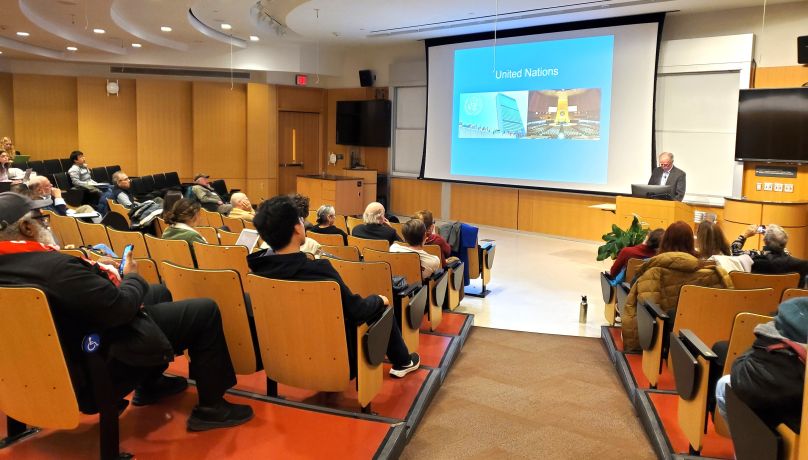
David Cortright’s University Lecture Remarks
On November 13, David Cortright, Reppy Institute for Peace and Conflict Studies visiting scholar and Professor emeritus of the practice at the Keough School of Global Affairs at the University of Notre Dame, delivered the University Lecture on “Peace Movements and Policy: Lessons for Gaza and Ukraine.” Cortright, an expert in nuclear disarmament and the international peace movement, spoke about the history of the peace movement, including his motivation for involvement, and the implications and prospects for this movement in light of recent events in Ukraine and Gaza.
See the text of Cortright’s remarks here. You can also view a video of his talk on the PACS YouTube Channel.
